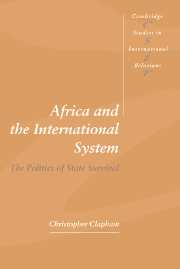Book contents
- Frontmatter
- Contents
- Acknowledgements
- List of acronyms and abbreviations
- Part I African states and global politics
- Part II Patterns of alliance
- Part III Struggling with decay
- 7 The international politics of economic failure
- 8 The Externalisation of political accountability
- 9 The International politics of insurgency
- 10 The privatisation of diplomacy
- 11 Conclusion
- Notes
- Bibliography
- Index
- CAMBRIDGE STUDIES IN INTERNATIONAL RELATIONS 50
9 - The International politics of insurgency
Published online by Cambridge University Press: 09 October 2009
- Frontmatter
- Contents
- Acknowledgements
- List of acronyms and abbreviations
- Part I African states and global politics
- Part II Patterns of alliance
- Part III Struggling with decay
- 7 The international politics of economic failure
- 8 The Externalisation of political accountability
- 9 The International politics of insurgency
- 10 The privatisation of diplomacy
- 11 Conclusion
- Notes
- Bibliography
- Index
- CAMBRIDGE STUDIES IN INTERNATIONAL RELATIONS 50
Summary
Insurgency and the African international order
One of the clearest symptoms – and also causes – of state decay in Africa was the growth of armed opposition movements against the state, originating usually in the least accessible areas of the countryside, which came to pose a serious challenge not just to individual states, but to the African international order as a whole. Variously described as guerrilla movements, liberation struggles, or indeed as private armies, terrorists or secessionist bandits, these movements may – without overlooking the important differences between them – be examined together under the reasonably neutral term, insurgencies. Two regions of the continent, the Horn and southern Africa, were particularly affected by insurgent warfare, and in each case fostered a mass of competing movements which interacted with the states of the region to exercise a powerful effect on its international relations. Insurgent warfare also affected other states, including Chad, Uganda, Rwanda and Zaïre in central and eastern Africa, and Liberia and Sierra Leone in West Africa, which, however, was generally the least insurgent-affected part of the continent. A small but significant number of African governments came to power as a result of insurgency; and two states, Liberia and Somalia, were destroyed by insurgent movements which, fragmenting into numerous different factions, were unable to establish any effective regime. Occasionally, however, and notably in Uganda, insurgency provided the means for reconstructing states which appeared to have almost collapsed.
- Type
- Chapter
- Information
- Africa and the International SystemThe Politics of State Survival, pp. 208 - 243Publisher: Cambridge University PressPrint publication year: 1996

